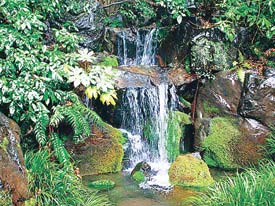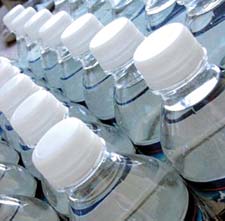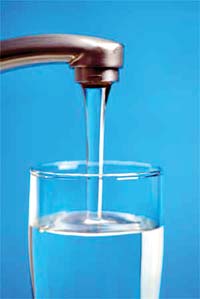Variety
Different types of drinking water
Today is World Water Day. As you may know, most parts of the Earth(71
per cent) are covered with water. However, most of this water(97 per
cent of it) is salty and is not suitable for drinking. Only about three
per cent of the Earth's water reserves comprise drinking water.
|

Spring water |
|

Bottled water |
The water that we drink is also not as simple as it seems. There are
many different varieties from the plain well and tap water to water that
is fortified with many vitamins and minerals.
Although most people believe that all bottled water is the same, this
is not so. The differences are mainly in the origin and method of
processing used. The US Food and Drug Administration, the federal agency
that regulates all bottled water, has established guidelines which
categorise the different types of bottled water. Some of them are
mentioned below:
* Well water - This is the
most common form of water used in countries such as Sri Lanka. It is
water dug out of a hole in the ground that taps its underground source.
* Artesian well water - Is
the water from a well that taps a confined aquifer - a water-bearing
underground layer of rock or soil - in which the water level is above
the top of the acquifer.
* Tap water - Another
common form of water, this is obtained primarily from local catchment
areas. Tap water contains many minerals such as calcium (good for the
bones), chloride, magnesium (good for the heart), potassium and sodium
and traces of iron and manganese.
* Spring water - This is
drinkable water that is drawn from a spring or through a borehole
tapping an underground formation feeding the spring.
* Mineral water - It has
many minerals dissolved in it such as calcium, iron and magnesium. This
water usually tastes pure and clean and doesn't leave an aftertaste and
is therefore popular with most people as drinking water.
It is also believed by some people that drinking only mineral water
would improve the condition of one's skin. Of course it is a well-known
fact that drinking plenty of fluids aids the skin by improving blood
circulation and effectively removing toxins from the system.
However, this alone is not enough. One also needs a healthy diet as
well as exercises to maintain good skin. Also, it is said that water,
milk, fruit juices without any additives and caffeine-free drinks are
the best skin hydrants rather than mineral water.
* Sports or fitness water
- This is drinkable water that has gone through a process of further
purification and scientific formulation. It generally contains
carbohydrates, electrolytes or sodium and is fortified with Vitamin B to
help in the process of energy metabolism. It is also considered as a
soft drink.
Here is some important advice for those of you who may be keen
sportspeople. After a bout of exercising, it is important that you
replenish body fluids immediately to prevent dehydration.
|

Tap water |
Drinking plenty of water may be sufficient to replenish the fluids
the body may have lost during a shorter period of low-intensity
exercising such as half an hour of walking. However, after
high-intensity sports carried out over a longer period, such as running
or swimming for more than an hour, a sports drink would be a better
choice.
* Sparkling water - This
is fizzy as it has some amount of dissolved carbon dioxide which it had
taken when it emerged from the source. Some people find that this water
tastes better than ordinary tap water, although some may consider it
more as a soft drink. It is also labelled as sparkling drinking water,
sparkling mineral water and sparkling spring water.
* Purified water - A pure
form of water which has been obtained through the removal of bacteria
and dissolved solids with a process such as distillation, deionization
or reverse osmosis. It is known as purified drinking water, but the name
of the process used to clean the water ex. reverse osmosis drinking
water, is used.
* Distilled water - A pure
form of water that has been extracted by boiling tap water and
condensing the steam. It contains only a few minerals and is therefore
tasteless, resulting in some people preferring it to tap water.
* Vitaminised water - This
is drinkable water which has been fortified with added vitamins.
However, it is also said that most vitamins added to water are soluble
in water and will therefore pass out of the body quickly.
Drinking too many of these bottles with added vitamins is also not a
good idea, as this could lead to diarrhoea.It is believed that taking in
too much of some vitamins such as more than 3,000mg of Vitamin C may
lead to diarrhoea.
So, if you drink vitaminised water, ensure that the Vitamin C content
in all the water that you drink does not pass the 1,000mg per day
level.It is believed by some people that drinking cold water burns more
calories, but may have an adverse impact on certain organs of the body.
However,doctors are of the opinion that though drinking cold water
may burn some calories, this may not be significant enough to have any
effect on the body weight. Also, it having any adverse effects on the
organs may not be true unless one drinks quite a large amount of water;
this may cause hypothermia or water intoxication. |


